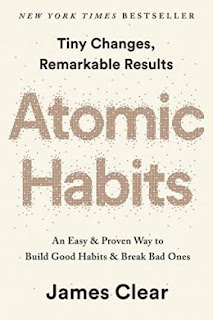Book Review: Atomic Habits
I recently finished a good book, Atomic Habits, by James Clear. It is clear by now that my book reviews have also been doubling as book summaries for future reference. This is a delightful read as the author uses his personal experience to illustrate his theories. The arguments are logical and generally well explained. Here are some key points to note:
- What is a habit? It is a solution to a recurring problem in life. A habit helps us solve problems with as little energy as possible. Habits consist of four parts: cue, craving, response and rewards. To create a good habit, make the cue obvious, the craving attractive, the response easy and the reward satisfying. To lose a bad habit, simply do the reverse
- Never underestimate the compounding effects of habit: Habits are usually small changes in our behavior that may not bring immediate benefits when deployed. However, just like compound interest for your money, when applied over time, good habits will yield wonders for your life. On the contrary, bad habits will bring you on a very different path!
- Get to the critical point: Good habits are often foregone because they don't immediately yield results. People give up their gym memberships because there is little effect after a week of hard work. But if you move ice cube from the freezer into your room, nothing will happen as its temperature increases from -20°C, to -19°C, -18°C,... until you hit the critical point of 0°C. Then ice becomes water, which is very different from its solid form, and is altogether something else. If you heat that water to 100°C, then it becomes water vapour which again is very different from its liquid form. Habits are just like that. Once you hit the critical point, a whole new world appears
- Focus on your habits, not goals: Habits define essentially a system that provides a process to get things done right and efficiently. Goals on the contrary, are temporary in nature. If you have a habit of going to the gym every day, this will keep you physically fit until you stop the habit. If your goal is to lose ten pounds however, then you can stop going to the gym once you hit that goal. Lose the goal and gain a habit
- Use hacks to form good habits:
- Stack your habits one over another to create an exponential impact over time
- Find the goldilock zone for your habits by making them neither too easy nor too hard
- Shape your environment to induce good habits and avoid bad ones
- Apply the two-minute rule to reduce the entry barrier of forming a good habit
- Delay instant gratification. This is contrary to what our species was used to back in our hunting days. But delaying a reward (often) for a bigger return is actually more beneficial overall.
At the end of the day, good habits are essential to our success. Most people recognize a good habit and can start one with ease. Many give up good habits midway however, because they lack the understanding to keep up. Using the above hacks will certainly help. However, Clear mentioned that the greatest obstacle to keeping a habit is perhaps being able to stand the "boredom" of doing repetitive routines. This is especially true in the world of sports. No wonder there are so few elite athletes in the world. It makes me appreciate them more as they not only create great habits in toning their trade, but also in their diets, physical fitness and other aspects of their life.
- PTS




Comments
Post a Comment